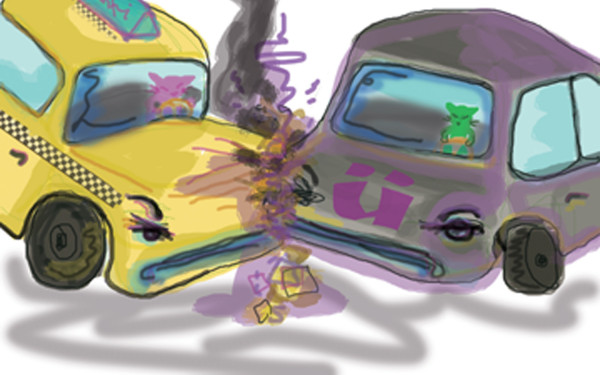Montreal Anarchist Film Festival Kicks Off
Giving the Spotlight to Radical Films
If you ask Chris Robe, he’ll tell you that there’s been a strong anarchist tendency in video-making since the late 1960s.
Robe, author of Breaking the Spell: A history of Anarchist Filmmakers, Videotape Guerillas, and Digital Ninjas, says that video itself has become a form of activist practice over time. He traces early successful organizing campaigns which have relied heavily on video, such as AIDS activism to modern radical movements that integrate video into their organizing strategies.
Robe hosted the Canadian launch for his book at an appropriate space—the Montreal Anarchist Film Festival—which takes place this year on the evenings of May 11 and 12 at Katacombes, a worker-owned bar and event venue on St. Laurent Blvd.
This is the third year that the festival has taken place, always occurring during the month of May. It goes on in tandem with the Festival of Anarchy, which also includes the Montreal Anarchist Bookfair and the Montreal Anarchist Theatre Festival.
The Anarchist Film Festival is organized by the Insurgent Projections collective, which organizes radical monthly film screenings throughout the year. Insurgent Projections was formed in early 2014 by members of SubMedia and Ni Quebec Ni Canada.
Franklin Lopez, the founder of SubMedia and co-founder of Insurgent Projections, has been involved with the Festival since it was re-founded (a previous iteration existed in Montreal until the early 2000s). Lopez said that the two goals of the festival are to give a platform for anarchist filmmakers to showcase their work, as well as to help build and strengthen the growing worldwide network of radical media-makers.
“We’re not really given a lot of space in society,” he said. “So as true believers in direct action, we said that we’re not going to wait for it, we’re going to carve out our own space.”
Insurgent Projections selects films for the Festival through a collective decision-making process. This year, they launched a call-out through FilmFreeway, an online service where filmmakers send their works to organizers of various festivals.
“When you look for the word ‘radical’ or the word ‘anarchist’ in their search engine, we’re the only festival that comes up,” Lopez said. “So I’m sure that for radical and anarchist filmmakers, it was a no-brainer that this was a festival where their films could fit in, so we got a lot of submissions.”
The collective then watches each film, and selects which ones will be screened using a consensus process.
“We’re not really given a lot of space in society. So as true believers in direct action, we said that we’re not going to wait for it, we’re going to carve out our own space.” — Franklin Lopez
This year, one of the projects that stood out was a movie called Hron: A Country of Ghosts, a queer anarchist work of science fiction which is currently beginning its production. The team debuted the film’s trailer at the Festival. The film is expected to be finished next spring.
Hron is based on the book A Country of Ghosts by Margaret Killjoy. The book’s story revolves around a journalist within the fictional empire of Borolia, who is sent on an assignment to cover the empire’s colonial expansion into an anarchist society, where the empire hopes to begin large-scale resource extraction. The anarchist society resists this expansion, and they eventually kidnap the journalist. Once embedded in their society, the journalist begins to question the empire in which he was born.
Eli Girard, a member of the production team for Hron, said that the film aims to embody anti-authoritarian values in its cast, its crew and in the film itself. Some changes have been made to the story for its film adaptation, notably that the film will not focus on a single protagonist, but will have many main characters.
During the casting process, the characters were not gendered—allowing anyone, of any gender identity, to apply for any role. Once the casting was completed, the characters, script, and costumes were adapted to better fit the identities of the actors.
Girard said that they hope to have a different type of queer representation in the film.
“Queer and trans stories are always about coming out, or tragic stories, stuff like that. We worked on making the cast and story more queer, but as something that’s part of people’s everyday lives, not as the main focus… [The characters] are living a story of love and war, while being queer, while being trans, while being a person of color.”
The Festival also included documentaries on a wide range of issues such as migrants in Italy, and the acceptance of illness.
Franklin Lopez said that he sees the Anarchist Film Festival, and other public events that focus on radical media-making, as a way to help strengthen social movements.
“The media has become much more atomized and isolating,” Lopez said. “With the advent of really short videos on the internet, people are consuming their media by themselves, on their cell phones, on their laptops. We’ve always wanted to make a break with that.”
Hosting public and accessible events such as film screenings, Lopez said, is an opportunity for radicals to get together and meet each other when they may not have otherwise. Film screenings, he added, are extremely easy to organize.
Lopez said that he hopes to see more radical filmmakers embody their values within the work that they do.
“People who espouse radical and anarchist beliefs and are filmmakers, it’s their duty that their films actually contribute to movements of resistance, movements for liberation.”
The Montreal Anarchist Film Festival’s final night of screenings begins tonight at 6:30pm at Katacombes, 1635 St. Laurent Boulevard. Screenings will continue until midnight.

_600_832_s.png)

01_600_375_90_s_c1.jpg)


